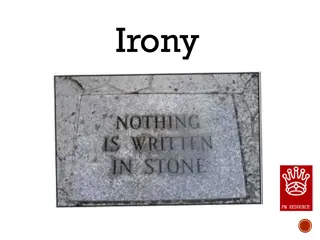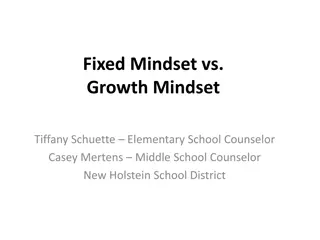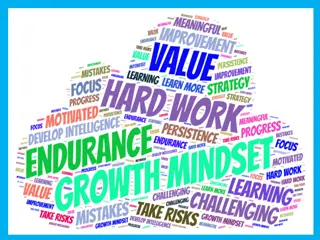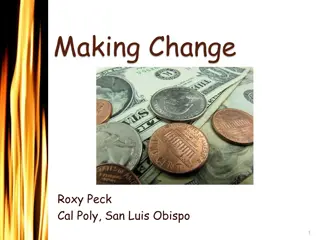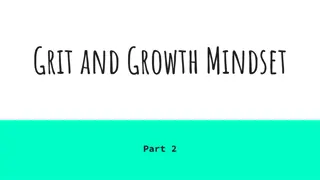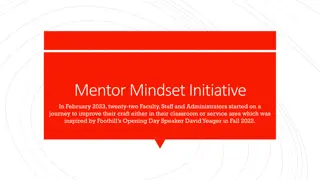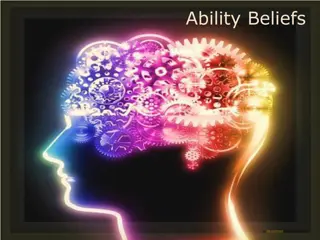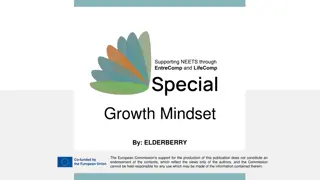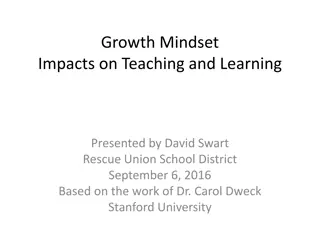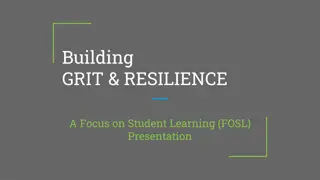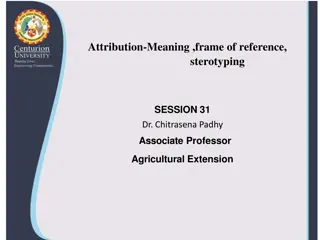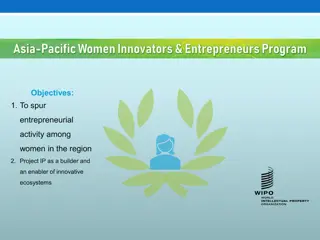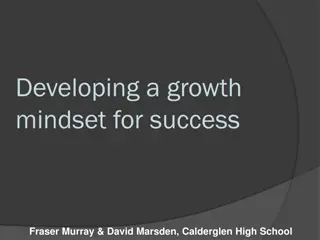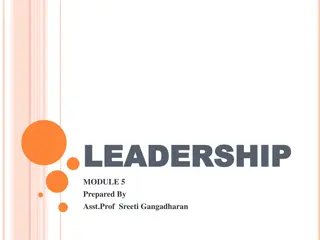Exploring Situational Leadership and Mindset in Educational Leadership
This educational session delves into Situational Leadership, utilizing the Hersey-Blanchard framework, to tailor leadership approaches based on the mindset, skill, and will of educators. It also discusses growth versus fixed mindsets and includes a practical mindset vignette for application. Participants engage in a simulated exercise to deepen their understanding and reflect on their interactions, aiming to enhance their leadership effectiveness in educational settings.
Download Presentation

Please find below an Image/Link to download the presentation.
The content on the website is provided AS IS for your information and personal use only. It may not be sold, licensed, or shared on other websites without obtaining consent from the author. Download presentation by click this link. If you encounter any issues during the download, it is possible that the publisher has removed the file from their server.
E N D
Presentation Transcript
Multi-Classroom Leadership Situational Leadership To copy or adapt this material, see OpportunityCulture.org/terms-of-use 2019 |1
Situational Leadership This session is based on Situational Leadership, a trademarked term from Blanchard, Hersey, and Johnson s Management of Organizational Behavior: Leading Human Resources Source: Blanchard, K., Hersey, P., and Johnson, D. (2000). Management of Organizational Behavior: Leading Human Resources. New York: Prentice Hall. 2019 |2
Situational Leadership Simulation Directions: Left row will play teachers (or paraprofessionals), and right row will play teacher-leaders. Please do not share the content of your cards. Each round will be 2 minutes in length. At the end of each round, the teacher- leaders will move to their right; everyone else stays put. Conduct simulation 3 times. Source: Hersey, Paul (1985). The Situational Leader. New York: Warner Books. 2019 |3
Debrief How did the interactions feel? Were some easier/more difficult than others? Frustrated Uncomfortable or nervous Silly Easy and natural 2019 |4
Session Objectives Discuss the differences between growth and fixed mindsets. Introduce the Hersey-Blanchard framework for situational leadership. Brainstorm how to tailor your leadership depending on the mindset, skill, and will of your teachers and/or paraprofessionals. 2019 |5
Mindset Vignette The students in this year s third-grade class have been a challenge since kindergarten, and this is definitely true in Sandra Hill s classroom. She has a rambunctious group of boys who just will not sit still or be quiet. To make matters worse, there are several girls who pick on and fight with one another even though they claim to be friends. But this is what they have been like since kindergarten, so why should she expect anything different? Nothing she does will change them. 2019 |6
Type of Mindset Source: Dweck, Carol S. (2006). Mindset: the New Psychology of Success. New York: Ballantine Books. Success of Others Criticism Effort find lessons and inspiration in the success of others learn from criticism see effort as the path to mastery Obstacles persist in the face of setbacks Growth Mindset Challenges embrace challenges Fixed Mindset avoid challenges give up easily see effort as fruitless or worse ignore useful negative feedback feel threatened by the success of others 2019 |7
Your Own Mindset Everyone experiences different mindsets in different situations. Think of situations when you have said or thought these four things: Why keep on working on this? It s pointless! I won t take those suggestions my principal/coach/boss gives me because they don t really get what I m doing. I m really just no good at this. Someone else can do it. [Insert colleague/sibling/friend s name here] is so much better at this than I am. I need to find something else I can do well. 2019 |8
Hersey-Blanchard Framework See Handout (Low) <------ Commitment (will) Level -----> (High) Directing Delegating Low Skill High Will High Skill High Will Ex: A new teacher who constantly seeks feedback, wants to improve. Could say things like What should I do? Ex: A high-performing teacher who owns her own development. Supporting Coaching Low to Mid Skill Low Will Mid to High Skill Low Will Ex: A veteran teacher not getting results that does not seem invested in wanting to change his practice. Ex: A teacher who is getting good results but is not open to changing her curriculum. (Low) <------ Competency (skill) Level -----> (High) Adapted from Blanchard, Ken (2003). The One Minute Manager. New York: William Morrow Company. 2019 |9
Jigsaw Activity 1. Break into small groups of four. 2. Assign each group member one Situational Leadership quadrant. 3. Group members move to chart paper with assigned quadrant. With your chart paper group, make a comprehensive list of next steps and ideas for MCLs and TRTs to best lead others in your assigned quadrant. (10 min) 4. Come back to original groups. Each group member shares ideas discussed in their quadrant s chart paper group. (10 min) 2019 |10
Action Steps Write down and share a few next steps you commit to incorporating into your work based on your takeaways from this session. Next Steps People Timeline Notes 2019 |11
1 Sources Blanchard, Ken (2003). The One Minute Manager. New York: William Morrow Company. Dweck, Carol S. (2006). Mindset: the New Psychology of Success. New York: Ballantine Books. Hersey, Paul (1985). The Situational Leader. New York: Warner Books. 2019 |12
Follow Us! Keep up to date on Opportunity Culture with resources and research from Public Impact by following: @OppCulture @PublicImpact Facebook.com/OpportunityCulture Facebook.com/PublicImpact LinkedIn.com/company/public-impact---chapel-hill-nc Subscribe to the quarterly Opportunity Culture newsletters, with content by and for Opportunity Culture educators, and sign up to get Remind messages for them: Remind.com/join/ocnew OpportunityCulture.org/mailing-list/ 2019 |13




